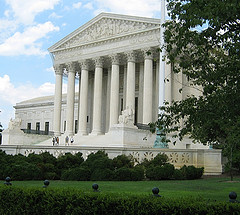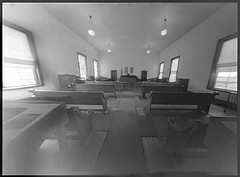Copyright 2007-25 Digital Media Law Project and respective authors. Except where otherwise noted,
content on this site is licensed under a Creative Commons Attribution-Noncommercial-ShareAlike 3.0 License: Details.
Use of this site is pursuant to our Terms of Use and Privacy Notice.
content on this site is licensed under a Creative Commons Attribution-Noncommercial-ShareAlike 3.0 License: Details.
Use of this site is pursuant to our Terms of Use and Privacy Notice.


 From the ever-growing file of trademark cases that are bad for free
speech,
From the ever-growing file of trademark cases that are bad for free
speech,  Ron Paul's presidential campaign has been having a rough go of it: He has yet to win a Republican state primary or caucus. But now his campaign's also-ran streak extends into the courtroom too, in a victory for the right to anonymous free speech.
Ron Paul's presidential campaign has been having a rough go of it: He has yet to win a Republican state primary or caucus. But now his campaign's also-ran streak extends into the courtroom too, in a victory for the right to anonymous free speech.
 A bit of good news for those of us keen on open government: The Senate Judiciary Committee today voted 11 to 7
A bit of good news for those of us keen on open government: The Senate Judiciary Committee today voted 11 to 7  When web developer
When web developer  A French court last month stomped on what we in the United States consider a “basic, vital, and well-established liberty” – the right to record and publish the public activity of police.
A French court last month stomped on what we in the United States consider a “basic, vital, and well-established liberty” – the right to record and publish the public activity of police.
 Back in March, I
Back in March, I  After a slow start, the latest experiment of video cameras in federal courtrooms,
After a slow start, the latest experiment of video cameras in federal courtrooms,  Last week the
Last week the  The U.S. Department of State maintains a
The U.S. Department of State maintains a 
Description:
Liberty Media Holdings, an adult film company, filed suit on May 6, 2011, against approximately 50 Massachusetts residents for copyright infringement of material allegedly shared over a BitTorrent file transfer protocol. The complaint claims that defendants, through the use of a BitTorrent protocol, were allowed to join a "swarm" of hosts and could consequently download and upload content from each other. The complaint details the the process by which this happens, alleging that the practice ends in each defendant (each member of the "swarm") simultaneously stealing and redistributing Liberty Media's copyrighted material.
Liberty Media asserted two separate copyright infringement claims against defendants: first, that defendants wilfully and intentionally used the BitTorrent protocol to make unauthorized copies of a Liberty Media motion picture and distribute them to others, in violation of 17 U.S.C. § 501; and second, that defendants are responsible for contributory copyright infringement, because they each knew multiple people were involved in the illegal distribution, and because the infringement by other BitTorrent users would not have occured but for each defendant's participation in the infringement. Liberty Media is seeking an injunction preventing defendants from further infringement, as well as $150,000 per defendant in statutory damages plus costs and attorney's fees.
According to the complaint, Liberty Media identified each defendant by his or her IP address. Liberty Media consequently filed an emergency ex parte motion for early discovery, requesting that the court direct the defendants' Internet service providers (ISPs) to disclose each individual's identity. In its memorandum in support of its motion, Liberty Media claimed that it had adequately asserted a prima facie case for copyright infringement, that the discovery request was reasonably specific, and that the defendants' identities were central to Liberty Media's case. On May 10, 2011, the court granted Liberty Media's motion, allowing Liberty Media to issue subpoenas on the ISPs.
In response to the court order, three separate defendants filed motion to quash the subpoenas. The motions to quash generally put forth similar legal arguments. The motions by Defendant Doe 2 and Defendant Doe 15 claimed the subpoena should be quashed because the records were located over 100 miles away. Doe 2 and an unidentified Doe claimed that Liberty Media did not provide sufficient information about the nature of the alleged file sharing, including amount of data shared or duration, and therefore failed to make a prima facie case for copyright infringement. The unidentified Doe also alleged improper joinder due to the risk of creating an unfair process and claimed that Liberty Media was attempting to reveal defendants' identities in order to coerce pretrial settlements.
Liberty Media opposed the motions, arguing that the court should not consider completely anonymous motions to quash. It also supported joinder of all defendants, citing previous John Doe file trading cases that have found joinder "not only proper, but ... the best and most efficient way to administer such lawsuits." Liberty Media finally claimed that the court should not consider arguments on the merits until defendants are named. The court denied each motion to quash on July 22, 2011, and stated that the defendants would not be permitted to proceed further using pseudonyms.
Between June 2011 and January 2012, Liberty Media voluntarily dismissed 23 defendants with prejudice. None of the notices provided a reason for the dismissal.
On January 23, 2012, after the voluntary dismissals, Liberty Media filed an amended complaint against the remaining defendants. The amended complaint alleged the same counts of copyright infringement as the complaint, and added claims of civil conspiracy and negligence. Liberty Media claimed that the conspiracy involved a scheme to traffic infringing content, and asserted that defendants knew the BitTorrent client would provide access to infringing content, and that each defendant intended to access the content for the purpose of reproducing and exchanging it in violation of copyright laws. Finally, Liberty Media claimed that if the defendants themselves did not use its copyrighted work, then defendants failed to adequately secure their networks, allowing others to access the Internet through their accounts. Therefore, Liberty Media argued, defendants should be held liable for negligence in "breach of the ordinary care that reasonable persons exercise in using an Internet access account."